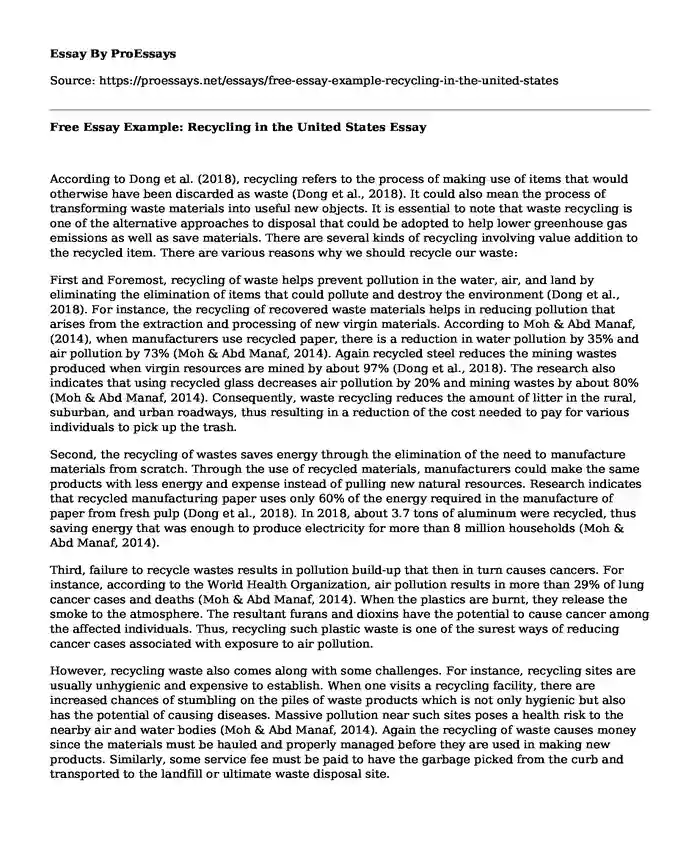According to Dong et al. (2018), recycling refers to the process of making use of items that would otherwise have been discarded as waste (Dong et al., 2018). It could also mean the process of transforming waste materials into useful new objects. It is essential to note that waste recycling is one of the alternative approaches to disposal that could be adopted to help lower greenhouse gas emissions as well as save materials. There are several kinds of recycling involving value addition to the recycled item. There are various reasons why we should recycle our waste:
First and Foremost, recycling of waste helps prevent pollution in the water, air, and land by eliminating the elimination of items that could pollute and destroy the environment (Dong et al., 2018). For instance, the recycling of recovered waste materials helps in reducing pollution that arises from the extraction and processing of new virgin materials. According to Moh & Abd Manaf, (2014), when manufacturers use recycled paper, there is a reduction in water pollution by 35% and air pollution by 73% (Moh & Abd Manaf, 2014). Again recycled steel reduces the mining wastes produced when virgin resources are mined by about 97% (Dong et al., 2018). The research also indicates that using recycled glass decreases air pollution by 20% and mining wastes by about 80% (Moh & Abd Manaf, 2014). Consequently, waste recycling reduces the amount of litter in the rural, suburban, and urban roadways, thus resulting in a reduction of the cost needed to pay for various individuals to pick up the trash.
Second, the recycling of wastes saves energy through the elimination of the need to manufacture materials from scratch. Through the use of recycled materials, manufacturers could make the same products with less energy and expense instead of pulling new natural resources. Research indicates that recycled manufacturing paper uses only 60% of the energy required in the manufacture of paper from fresh pulp (Dong et al., 2018). In 2018, about 3.7 tons of aluminum were recycled, thus saving energy that was enough to produce electricity for more than 8 million households (Moh & Abd Manaf, 2014).
Third, failure to recycle wastes results in pollution build-up that then in turn causes cancers. For instance, according to the World Health Organization, air pollution results in more than 29% of lung cancer cases and deaths (Moh & Abd Manaf, 2014). When the plastics are burnt, they release the smoke to the atmosphere. The resultant furans and dioxins have the potential to cause cancer among the affected individuals. Thus, recycling such plastic waste is one of the surest ways of reducing cancer cases associated with exposure to air pollution.
However, recycling waste also comes along with some challenges. For instance, recycling sites are usually unhygienic and expensive to establish. When one visits a recycling facility, there are increased chances of stumbling on the piles of waste products which is not only hygienic but also has the potential of causing diseases. Massive pollution near such sites poses a health risk to the nearby air and water bodies (Moh & Abd Manaf, 2014). Again the recycling of waste causes money since the materials must be hauled and properly managed before they are used in making new products. Similarly, some service fee must be paid to have the garbage picked from the curb and transported to the landfill or ultimate waste disposal site.
Conclusion
Concisely, although waste recycling comes with a few challenges of hygiene and cost, `it should be appreciated because of the immense benefits with which it comes along. For instance, recycling saves energy, reduces pollution to the environment as well as reduces exposure to cancer and other health challenges.
References
Dong, H., Geng, Y., Yu, X., & Li, J. (2018). Uncovering energy saving and carbon reduction potential from recycling wastes: A case of Shanghai in China. Journal of Cleaner Production, 205, 27-35. https://doi.org/10.1016/j.jclepro.2018.08.343
Moh, Y. C., & Abd Manaf, L. (2014). Overview of household solid waste recycling policy status and challenges in Malaysia. Resources, Conservation and Recycling, 82, 50-61. https://doi.org/10.1016/j.resconrec.2013.11.004
Cite this page
Free Essay Example: Recycling in the United States. (2024, Jan 12). Retrieved from https://proessays.net/essays/free-essay-example-recycling-in-the-united-states
If you are the original author of this essay and no longer wish to have it published on the ProEssays website, please click below to request its removal:
- Tackling Teenage Pregnancy as a Public Health Problem in England - Essay Example
- Solar Roof Tiles Essay
- Mental and Mental Health Nurse Practitioner in Texas Paper Example
- Access to Clean Water in South America Essay Example
- Water Quality in My Community Paper Example
- Paper Example on Huntsville: Alabama's 4th-Largest City Since 1805
- Free Essay Sample on Two Major ERP Software Solutions







